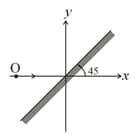Plane Mirror
Plane Mirror: Overview
This topic covers concepts, such as Effect on Reflection of Light Due to Rotation of Mirror, Reflection from a Plane Mirror, Plane Mirror, Field of View, Deviation by Plane Mirrors, Ray Diagrams in Plane Mirror, Nature of Image in Plane Mirror, etc.
Important Questions on Plane Mirror
In the figure shown consider the first reflection at the plane mirror and second at the convex mirror. AB is object

A point source of light is placed in front of two large mirrors as shown. Which of the following observers will see only one image of ?
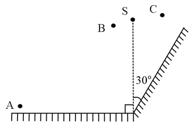
The reflection surface of a plane mirror is vertical. A particle is projected in a vertical plane which is also perpendicular to the mirror. The initial velocity of the particle is 10 m/s and the angle of projection is 60o. The point of projection is at a distance 5 m from the mirror. The particle moves towards the mirror. Just before the particle touches the mirror the velocity of approach of the particle and its image is:
There are two plane mirror with reflecting surfaces facing each other. The mirrors are moving with speed away from each other. A point object is placed between the mirrors. The velocity of the image will be
A light ray is incident on a plane mirror . The mirror is rotated in the direction as shown in the figure by an arrow at frequency . The light reflected by the mirror is received on the wall at a distance from the axis of rotation. When the angle of incidence becomes find the speed of the spot (a point) on the wall?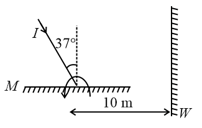
A point source of light placed at a distance in front of the centre of a mirror of width hung vertically on a wall. A man walks in front of the mirror along a line parallel to the mirror at a distance from it as shown in figure. The greatest distance over which he can see the image of the light source in the mirror is :
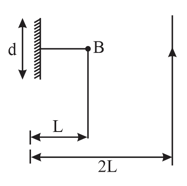
How many number of images formed by two plane mirrors when the angle of incidence is ?
A virtual and same size image as object can be obtained by-
Two mirrors are inclined at an angle as shown in the figure. Light ray is incident parallel to one of the mirrors. Light will start retracing its path after third reflection if :
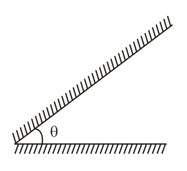
An object and a plane mirror are shown in figure. Mirror is moved with velocity as shown. The velocity of image is :
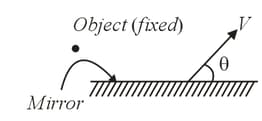
A ray of light is incident on a plane mirror at an angle of The angle of deviation produced by the mirror is
An object moves in front of a fixed plane mirror. The velocity of the image of the object is
Two plane mirrors are kept on a horizontal table making an angle with each other as shown schematically in the figure. The angle is such that any ray of light reflected after striking both the mirrors return parallel to its incident path. For this to happen, the value of should be
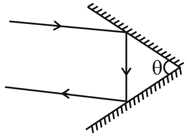
An object is moving towards a concave mirror of focal length . When it is at a distance of from the mirror its speed is . The speed of its image at the instant is
In the arrangement shown in figure, is a point source, and are two plane fixed mirrors inclined at an angle with each other. If , then the value of distance between two images formed.
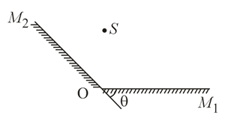
A ray of light is incident on a plane mirror at an angle of The angle of deviation produced by the mirror is
Two plane mirrors are placed parallel to each other at a distance apart. point object is placed between them at a distance from one mirror. Both mirrors form multiple images. What cannot be the distance between any two images ?
Two plane mirrors and are inclined to each other at . What will be the value of for which ray incident on the mirror at an angle falls on and is then reflected parallel to ?
Two plane mirrors, and are parallel to each other and spaced apart. An object is kept in between the points at from . Out of the following, the point at which image is not formed in the mirror is (Distance is measured from mirror )

